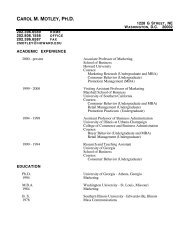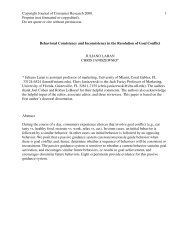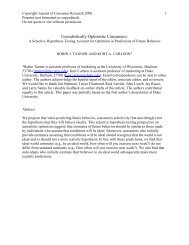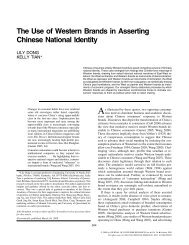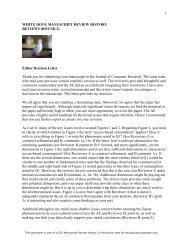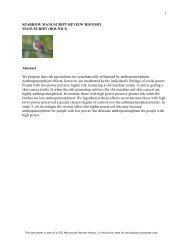Why Happiness Helps You See the Big Picture - Journal of ...
Why Happiness Helps You See the Big Picture - Journal of ...
Why Happiness Helps You See the Big Picture - Journal of ...
Create successful ePaper yourself
Turn your PDF publications into a flip-book with our unique Google optimized e-Paper software.
Copyright <strong>Journal</strong> <strong>of</strong> Consumer Research 2008.<br />
Preprint (not formatted or copyedited).<br />
Do not quote or cite without permission.<br />
16<br />
lead to abstract construal, whereas cueing negative information might automatically lead<br />
to concrete construal. Second, we show that mood also cues construal level. This has<br />
systematic effects on evaluations and choices people make. Third, and most important,<br />
we show that abstract construal does not increase adoption <strong>of</strong> all goals; ra<strong>the</strong>r, it<br />
increases adoption <strong>of</strong> abstract goals. Thus, abstract construal can reduce self-regulation<br />
when goals are concrete. This is a novel contribution to construal-level <strong>the</strong>ory.<br />
The current research also suggests several opportunities for fur<strong>the</strong>r research. For<br />
example, Fedorikhin and Patrick (2007) report that a positive mood that is accompanied<br />
by high arousal reduces self-regulation, and it is possible that arousal signals immediate<br />
concerns or is aversive and does not permit psychological distancing. O<strong>the</strong>r factors that<br />
reduce psychological distancing, such as high expectancy <strong>of</strong> success on a task, might also<br />
reduce <strong>the</strong> adoption <strong>of</strong> future goals among happy people (Eyal and Fishbach 2006). In<br />
addition, scholars could investigate whe<strong>the</strong>r some moods (e.g., happiness) correspond<br />
more with high-level construal than o<strong>the</strong>rs (e.g., calmness). For example, Higgins (1997)<br />
suggests that happiness results from promotion or eagerness goals and that calmness<br />
results from prevention or vigilance goals, and research suggests that promotion goals are<br />
more abstract than prevention goals. Similarly, dejection is a promotion emotion, and<br />
agitation is a prevention emotion; thus, it is possible that dejection, but not agitation,<br />
evokes high-level construal.



